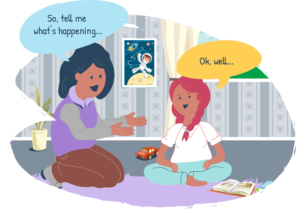7 Useful Tips For Good Communication With Children | Communicating With Children
Table of Interests
Today, you and I will quickly take a look at the topic “7 Useful Tips For Good Communication With Children | Communicating With Children”.
This has become necessary as we have sen overtime that several individuals have been searching for topics related to the above topic 7 Useful Tips For Good Communication With Children | Communicating With Children
However, if you are among those that have been searching for answers to [communicating with children, effective communication in childcare settings, parent child communication activities, importance of parent child communication, parent child communication articles, age appropriate communication strategies, communication with toddlers, why is communication important to children’s learning, 7 Useful Tips For Good Communication With Children | Communicating With Children], then you can see that you are not the only one.
Nonetheless, you shall get all this information right here on this blog.
7 Useful Tips For Good Communication With Children | Communicating With Children

Communication with children is essential, it is very true that children talk a lot, conversations are different and the function of their age depends on them. There comes a time when, instead of speaking with parents, they talk more with friends.
Depending on the age and the evolutionary process of the children, a conversation takes place, of more quality or of more quantity.
When children are small to an age of ten (10) or eleven (11) years, the child is fascinated by their parents, and that is when they try to tell everything, get attention, they are very curious. Children ask and believe everything parents tell them.
Since preadolescence and adolescence there is a change, children begin to identify with their peers, credibility is more in friends than in parents.
It’s when they start to:
Small conflicts appear that can hinder communication, such as:
- The child is more reserved.
- Comment with friends, because with adults there is a part of shame.
Then, the children reach a phase in which they stop being adolescents between the seventeen (17) years in which they have a critical opinion, they have their own ideas and they like to share them, they reaffirm to speak of values and politics. Children want to show parents or representatives who are already adults.
Appearing after all the above, the most empathic part, where the child becomes an adult with responsibilities, and begins to understand everything he did not understand when he was a child.
How is communication with children sought?

Parents should set limits, since by converting the conversation into colleagues or friends, the child may get confused.
You have to know how to differentiate between:
- The closeness.
- In knowing how to approach a topic with children in a calm environment.
- Be able to negotiate with children.
- Always be respectful.
Another thing is to share everything and not know how to set the limits. The role of parents apart from inculcating values, protecting children is to set a series of limits, which friends will not do.
You can not confuse the two (02) roles, one thing is friends and another thing is parents.
Can you talk to children about any topic without problem?

It all depends on age, but there are problems that are only for adults, such as concerns related to the economy, problems that children will not understand and that can also create fear in them.
The topics that can and should be discussed mainly and should always be open to what interests the children, for example:
- The children’s own problems.
- Be open to what the child demands and therefore to the questions they have.
- Topics of conversation directly and indirectly related to values.
See Articles Others Are Reading
- Study Abroad In Canada | See Top 10 scholarships To Study Abroad In Canada
- International Masters Scholarship at the University Of Oulu
- Fully funded Singapore International Scholarship
- Fully Funded Duke University International scholarship
- Kings College London International Scholarship
- All Harvard University Scholarships as well as Harvard University Full Scholarships ,Scholarships For Psychology Major | Psychology ScholarshipsAll JMU Scholarships & How To Apply | JMU Scholarship Application Scholarships To Pay Off Student Loans | Student Debt Relief Scholarships
Scholarships For African American Students | African American Scholarships
IIE Study Abroad Scholarships | Study Abroad Scholarships
Pennsylvania Scholarships | Verizon Pennsylvania Scholarship Fund
Google & Bertelsmann Fund 75,000 New Udacity Scholarships In Europe
Golf Scholarships | Golf Scholarships In USA For International Students
Asian American Scholarships | Japanese American Scholarships
4 Year Scholarships | List Of Full Ride Scholarships
Scholarships In Indiana | Indiana Scholarships For Education Majors
BMO Scholarship Program | BMO Diversity Scholarships
Jewish Scholarships | Jewish Scholarships In Los Angeles
UK Government’s Global Scholarship Programme | Apply Now
University Of South Carolina Scholarships | USC College Of Arts & Science Scholarships
Cancer Scholarships To Fund Cancer Studies & Researches | Cancer Research Grants
What should you be aware of when engaging in conversations with children?

- Take care of the moment to talk. If you are going to deal with a problem, conflictual in which there may be discrepancies, you should look for relaxed moments to do so.
- Show attention for what the child says. Speaking of attention is a bidirectional process. You have to let the person respond and know what you think.
- Non-verbal communication matters. Nonverbal communication must be consistent with what is said.
- The distractions must be out of place. These distractions can be, magazines, television, cell phones among others.
- Not everything is negotiable. You can not say “yes” to everything, so that children do not get frustrated. It must be taught that standards and values must be met.
What can you never say to children?

To avoid hurting them in their safety and self-esteem, children should never be told:
- Humiliating words.
- Disrespect them.
- Raise your voice.
- You do not need authority, yelling at children.
He can not do anything that can diminish his self-esteem, because the child tends to behave in a way that is counterproductive to him.
Parents should never forget that the communication process is a factor of success in the development of children and, therefore, communication will help them in the long road they must travel.
The more solid, effective and honest the communication you have with children, from parents to children, and the communication of children with parents, you will surely have better social ties.
Communication must be strengthened to promote children’s self-esteem.
That’s the much we can take on the topic “7 Useful Tips For Good Communication With Children | Communicating With Children”.
Thanks For Reading
See Other Articles Others Are Reading
- History As A Science | What Makes History A Science
- Fire And Safety | Basic Fire Safety Tips & Fire Safety Rules
- Myths Surrounding Exercises | All You Need To Know Concerning Exercises.
- Criminal Profiling – Facts Over Fiction | Criminal Profiling Techniques
- 5 Tips For Students Who Are Considering Graphic Design As A Career.
- Evaluation Of Learning: How To Know If The Children Are Learning

Leave a Reply